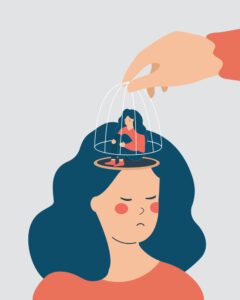An article recently published in the Journal of Affective Disorders finds that mounting research evidence demonstrates the effectiveness of Short-Term Psychodynamic Psychotherapy (STPP) in the treatment of depression.
Using meta-analytic methods – or the analysis of results of multiple previous studies – European psychiatrists led by Ivano Castelli found STPP to be more effective in reducing depressive symptoms than unstructured treatment and supportive therapy. In addition, the researchers found Cognitive-Behavioral Therapy (CBT) and STPP to be similarly effective and did not see increased improvement in patients who combined STPP with antidepressants. The authors write:
“The findings could provide significant data for updating APA guidelines for treating depression. In fact, STPP can be a useful ground for the treatment of patients with mild depression or who do not assume pharmacological therapy or in case of no benefits from cognitive-behavioral psychotherapy.”
 Depression is among the most common forms of psychological distress. Although a variety of treatments have been developed with the aim of improving psychological health and well-being in people experiencing depressive symptoms, psychiatric drug treatment is often used as the first line of treatment, despite evidence of limited effectiveness and negative side effects.
Depression is among the most common forms of psychological distress. Although a variety of treatments have been developed with the aim of improving psychological health and well-being in people experiencing depressive symptoms, psychiatric drug treatment is often used as the first line of treatment, despite evidence of limited effectiveness and negative side effects.
Moreover, Cognitive-Behavioral Therapy (CBT) is often viewed as the “Gold Standard” psychotherapeutic treatment for depression and other forms of suffering in many settings. However, there is limited evidence in favor of CBT’s superiority over other therapeutic approaches and models. The emphasis on CBT has led to a situation where providers’ lack of training in other models makes it difficult for people who have found CBT unhelpful to access different therapies.
Yet studies have found psychodynamic psychotherapy to be as effective as CBT and a positive alternative for depressed adolescents. Various psychodynamic approaches have also been found to be effective treatments for other mood disorders and panic disorders. In addition, psychodynamic therapy may offer additional benefits beyond the reduction of symptoms, such as improved reflective ability, feelings of empowerment, less internal conflict, and improvement of interpersonal relationships.
Finally, many psychodynamic psychotherapists – alongside humanistic psychologists – have taken issue with the Diagnostic and Statistical Manual of Mental Disorders (DSM) and have proposed their own alternative to understanding and identifying psychological distress. For these reasons, psychodynamic psychotherapy might be a beneficial alternative to what is currently being considered as gold standard and first line of treatment.
The purpose of the study was to evaluate the effectiveness of Short-Term Psychodynamic Psychotherapy for the treatment of depression. They first systematically reviewed the existing literature on the effectiveness of STPP and its comparability with control groups and other treatments. Of the 4910 articles identified during the review of the literature, 63 studies met the proposed criteria for revision. 31 of those 63 studies were finally included in their meta-analysis. The sample made up of the total amount of studies analyzed added up to 3,531 participants. This was mostly composed of people ages 18-65 who reported symptoms of depression and other mood disorders. The participants had partaken in 3-20 sessions, the average being 11 sessions.
Through statistical analyses, the researchers found that STPP significantly reduced depressive symptoms in depressed patients when compared to participants who did not engage in any form of treatment (e.g., placebo, waiting list). STPP was also found to be significantly more effective than treatment as usual and supportive approaches to therapy.
In relation to CBT, both interventions were found to be effective, although STPP was found to be mildly more effective than CBT. The combination of STPP and pharmacotherapy was not found to be superior to STPP alone. This study did find antidepressants alone to be superior to therapeutic treatment. However, a recent meta-analysis with a larger sample found that, over the long term, those in therapy showed more significant symptom reduction than those on antidepressants.
This study demonstrates what has been more frequently found in the more recent scientific literature: that psychodynamic psychotherapy is an effective psychotherapeutic treatment. Like previous studies, this article also highlights the non-superiority of CBT, which serves to further question CBT’s status as the gold standard of treatment. For these reasons, CBT, STPP, and other therapy models– and other approaches to healing beyond psychotherapy – should be made available to patients.
****
Casalli, I., Ilelmini, M., Bellini, A., Zizolfi, D. & Callegari, C. (2023). Efficacy of short-term psychodynamic psychotherapy (STPP) in depressive disorders: A systematic review and meta-analysis. Journal of Affective Disorders, 325, 169-176 (Link)















Wow. Who would’ve guessed that talking to someone could be helpful??? And wouldn’t it be great if people weren’t made to believe they need an “expert”???
Report comment
This is unsurprising given the dodo bird verdict, and highlights that the person suffering ought to be empowered to move towards whatever form of help feels right for them, and we ought to consider the person suffering themselves to be the authority on what might meet their needs, instead of an external party armed with a ‘best practice’ for a ‘diagnosis.’
Report comment
Precisely!
Report comment
Why not just leave “the experts” out of it?
Report comment
It’s not hard seeing how disconnected modern society is when you stop to think how insane it is having people pay someone for emotional support—and on top of THAT calling it “mental healthcare”. It’s not a sign of progress; it’s a sign of degradation.
And as corny as it sounds, things won’t change until people get out of their heads and into their hearts.
Report comment